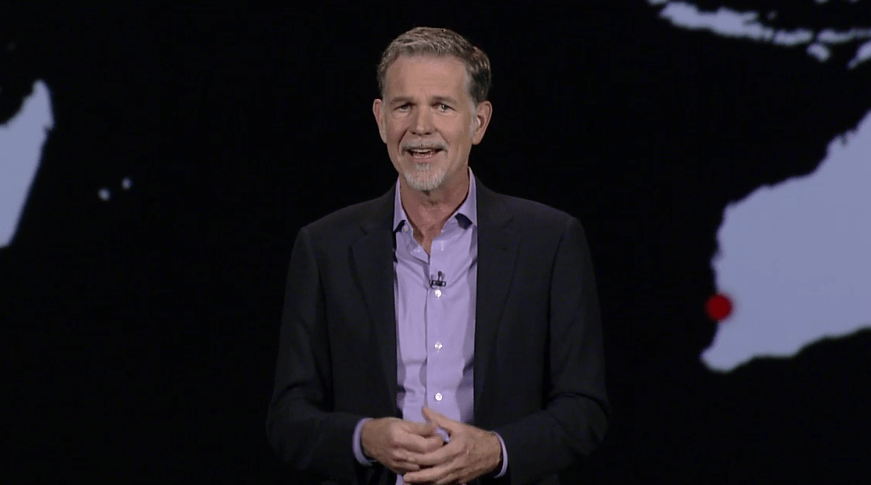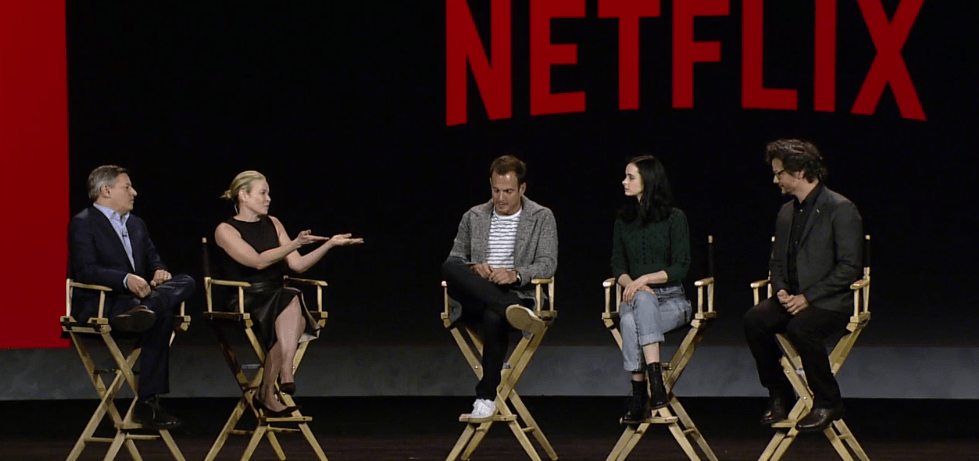Glimpse the Future of In-Flight Binge-Watching in Netflix CES 2016 Keynote
Share

APEX Insight: Netflix CEO Reed Hastings took to the CES stage yesterday to discuss what’s next for the media-streaming provider. “We want Netflix to work incredibly well whether you’re watching in the living room, in the metro or at 30,000 feet on Virgin America,” he said, citing discoverability and personalization as key to the future of on-demand entertainment.
“We can finally give people what they want,” said Netflix CEO Reed Hastings in his CES 2016 keynote. The Netflix presentation focused on global content, but in reading between the lines, we learn a lot about how Netflix may have its sights on passenger experience and global mobility.
Hastings said Netflix was the first to release content over a global footprint: no more region-specific release dates. “This is the Binge Era,” he remarked. Now Netflix delivers 125 million hours a day of entertainment around the world – not bad for a company that began by sticking DVDs in the mail.
Hastings said Netflix has helped the world’s biggest companies unlock the value of smart devices. The presence of Android as an in-flight entertainment and connectivity foundation platform points toward seamless integrations in the future. “We want Netflix to work at home, in the metro or at 30,000 feet on Virgin America,” said Hastings.
“We want Netflix to work incredibly well, whether you’re at home, in the metro, or at 30,000 feet on Virgin America.” – Reed Hastings, Netflix CEO
One key to the future of TV Everywhere is discoverability: finding what you want to watch. Hastings touted Netflix’s culture of “continuous learning” to improve discoverability, with tons of A/B testing to improve discovery, with the goal of making it effortless for the viewer. “We hope to get so good at suggestions that we show you exactly the right show for your mood the moment you turn on the TV,” he said. (There’s that trend again: personalization.)
Rights of Passage
During the 2015 APEX EXPO in Portland, Netflix and Virgin America announced that the video on-demand service would be available for free on the airline’s seatback system and passenger device. To access the catalogue, passengers can either login or sign up for a 30-day trial. The service will be free until March this year.
The announcement made waves in the in-flight entertainment industry. “I think there is a great deal of confusion about subscription-based services such as Amazon and Netflix in regards to these services being made available to passengers on airline,” Jeff Crawford, senior vice-president, Non-Theatrical Sales, Warner Bros., told APEX Media in an exclusive, APEX Direct op-ed. Crawford cited bandwidth access, complications of regulating subscription-based models and rights issues as issues such services would have to face.
Global Trailblazers
From a certain point of view, Netflix actually followed in the footsteps of in-flight entertainment. Only at cruising altitude could you shift viewing regions in moments, and the content available reflected that dynamic. International travelers were (and are) lucky to get sneak peeks at content not yet available at home, while first-run movies are often held back if they’re not yet in cinemas at the flight’s destination.
“Linear TV, the kind we grew up on, must aggregate all sorts of content and hope the audience finds it at the right time,” said Sarandos. The streaming model lets shows with smaller audiences reach those audiences with greater accuracy, he adds, “Linear TV only scores with home runs… We score with home runs, too, but we also score with singles, doubles, and triples.” He highlighted Orange is the New Black as a show whose cast would never have been assembled on network TV. (Amazon Video does this too, with shows like Transparent.)
“We’re in a unique position to bring the world’s stories to the world’s people,” said Sarandos. The “we” in this case can easily be extrapolated beyond Netflix, beyond Amazon, and to services like Spotify and YouTube as well. Linear TV is increasingly becoming the exception; though its limitations remain an albatross around the neck of anywhere-anytime entertainment. As Sarandos put it, terrestrial distribution is “subject to business models they don’t understand and don’t care about.” The current video-entertainment business model, he added, “confound[s] common sense and human happiness.”
Special Guest Stars

During the keynote, Chelsea Handler, who’s bringing two shows to Netflix, interviewed Will Arnett (BoJack Horseman, Flaked), Krysten Ritter (Jessica Jones), and Wagner Moura (Narcos). Arnett said, “We’re throwing out the old paradigm. It’s completely gone.” Perhaps an overstatement at this precise moment, but the writing is on the wall.
Hastings took the stage again and said, “It took a decade for the Internet to become robust enough for streaming to become a reality.” About 3.2 billion people are online today, he said, up from 400 million in 2000. Even as countries and companies struggle with rights, payments, and content ratings, the technology continues to improve. Hastings said that people would rather pay than pirate if it was easy to see what they wanted, when they wanted.
While the keynote was underway, Netflix went live in 130 new countries. It’s now essentially a global TV and movie network, reaching almost every country in the world – Hastings even noted that brining the service to China was a goal. “We listen, we learn, we improve.”
Watch the abridged version of Hastings’ CES 2016 keynote:
*This post was updated Friday, January 8, 2016.


